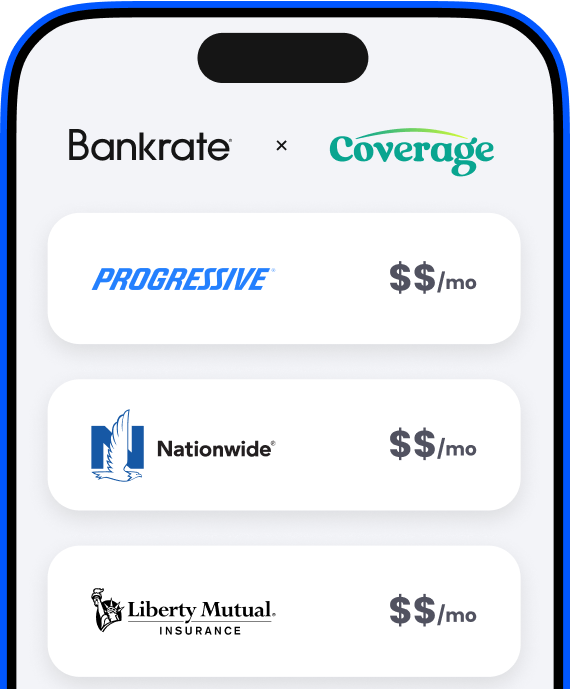Car insurance quotes are just around the corner
Get car insurance quotes from top insurers. It's quick, easy and free.


Explore offers from trusted carriers

Powered by Coverage.com (NPN: 19966249)
Coverage.com, LLC is a licensed insurance producer (NPN: 19966249). Coverage.com services are only available in states where it is licensed. Coverage.com may not offer insurance coverage in all states or scenarios. All insurance products are governed by the terms in the applicable insurance policy, and all related decisions (such as approval for coverage, premiums, commissions and fees) and policy obligations are the sole responsibility of the underwriting insurer. The information on this site does not modify any insurance policy terms in any way.

See what actual drivers are being quoted from Coverage for car insurance.






What information to have on hand to get your online car insurance quote
Finding car insurance quotes starts with being prepared. By having pertinent policy information readily available, you can save time and ensure accurate quotes.
Driver's license
Along with your address, carriers require the full name, date of birth, marital status, gender and driver's license number for all drivers.
Vehicle information
Providing the full vehicle identification number (VIN) for all vehicles will help your quotes be accurate. If you don't have the VIN available, provide the year, make, model and trim level of the cars, but be aware that quotes may change once the VIN is updated.
Other vehicle details
Provide the name and address of the leasing or loan company if you have one. Also, the carrier will ask about your annual mileage, how the car is being used and vehicle modifications.
Claim history
Be aware of any tickets or accidents for all drivers over the past five years. Knowing dates and claim payout amounts will be helpful in your quote accuracy.
Additional information
Carriers may inquire about your current profession and highest level of education. Now is also a good time to provide information required for certain discounts, such as the current GPA for your teen driver to receive a good student discount.
Coverage requirements
Match the coverage types and limits to your current policy (if you have one) for an apples-to-apples comparison. However, don't be afraid to ask for additional quotes at various levels to find the right fit.
Why use Bankrate?
Bankrate provides independent insurance information and expert insights into auto insurance to help readers feel more confident in their financial decisions. Whether you get quotes through an independent agency that works with several carriers like Coverage, or directly from a carrier like Progressive, understanding what questions to ask and how auto insurance works can help you navigate the quote process.
Knowledge is power, and that is where Bankrate is here to help. We analyze data from Quadrant Information Services each month to provide you with the latest average car insurance rates from all 50 states and Washington, D.C.
Our expert staff of writers and editors includes licensed insurance agents who tackle insurance topics ranging from saving money and changes in insurance laws to how the economy can impact your auto insurance costs.
Then, we use this information to help you:
- Find personalized car insurance quotes
- Learn how to choose the best car insurance company
- Discover how different life events impact your auto insurance costs
- Create a plan to lower your car insurance rate
With this information in hand, you have the tools you need to find an auto insurance quote that works for your budget and coverage needs.
Our partnership with Coverage
Coverage is our trusted and preferred Bankrate partner that helps you easily find and compare personalized offers from top insurance providers like Nationwide, Liberty Mutual, Safeco and many more.
on Coverage's website

Should you bundle?
One way to save money on car insurance is by taking advantage of some of the many discounts available from insurance companies. Along with the multi-car discount, the bundling discount, where you have two or more policies (like your home and auto) with the same carrier, can give you the biggest bang for your buck.
Save more money by bundling your home and auto insurance
Bundling discounts aren't just for homeowners! Many carriers offer a bundling discount to drivers who pair their auto policy with other insurance products, such as renters insurance or condo insurance, and sometimes even life, boat or RV insurance.
Types of car insurance coverage available
Insurance needs fluctuate between drivers and their specific situations. Luckily, there are several types of car insurance options, from bare-bones coverage to coverage with all the bells and whistles.
Liability insurance
Liability insurance has two components: bodily injury liability coverage and property damage liability coverage. These coverage types make payments to third parties when you cause an accident. Bodily injury insurance pays for medical expenses, lost wages and legal fees. Property damage insurance pays to repair or replace damaged property, such as the other driver's vehicles or personal items inside the car.
Liability insurance is mandatory in all states (except New Hampshire) and Washington, D.C., and each state sets a minimum coverage requirement.
Personal injury protection
Personal injury protection (PIP) provides coverage for medical bills, lost wages and other expenses for you, your passengers and household relatives when injured in a car accident. Since this coverage pays out regardless of who is at fault for the accident, it is often called no-fault coverage and is required coverage in no-fault states. PIP is optional in many other states.
Uninsured motorist coverage
Often misunderstood, uninsured motorist insurance is not coverage for uninsured drivers. Rather, it pays for the medical costs for you and your passengers as well as your vehicle repairs when an uninsured driver is responsible for the accident, including hit-and-runs. This coverage is required in 21 states and Washington, D.C., and available as optional coverage in all others.
Underinsured motorist coverage
Underinsured motorist coverage pays for medical costs for you and your passengers as well as your vehicle repairs if an at-fault driver does not have enough coverage for the resulting damages from the accident.
Comprehensive coverage
Comprehensive coverage pays to repair or replace your vehicle when it is damaged from a loss resulting from something other than a collision. Some carriers actually call this coverage “other than collision” coverage or OTC. Perils typically covered are theft, vandalism, and damage from severe weather and climate events, like flood, fire, wind and hail. This coverage pays out up to the actual cash value of your vehicle, minus the deductible. This coverage is typically required if you have an auto loan or lease.
Collision coverage
Collision coverage pays to repair or replace your auto when it is damaged in a collision. It also covers rollover accidents and pothole damage. Just like comprehensive coverage, there isn't a predetermined coverage limit. The coverage pays out up to the actual cash value of your vehicle, minus the deductible. This coverage is typically required if you have an auto loan or lease.
Medical payments coverage
Medical payments coverage (often called MedPay) provides payment towards medical-related expenses resulting from a car accident. It covers you and your passengers and will pay out regardless of fault. While it is considered optional coverage in most states, it is required in Maine and New Hampshire (when an auto policy is purchased).
Gap coverage
Gap coverage is only available for newer vehicles with a lease or loan. When a car is totaled in a covered claim, this coverage pays the difference between the actual cash value of the claim payout and the remaining balance left on the lease or loan. Gap coverage can be purchased from dealerships and financial companies, but drivers can usually save money by buying it through their insurer. However, not all insurance companies offer this coverage.
Benefits of getting a personalized quote
Getting a personalized auto insurance quote instead of a general estimate can help you avoid surprise rate increases once you're ready to purchase your new policy. Car insurance quotes with incomplete VINs and missing driver's license numbers don't give you a true picture of what you can expect to pay for the actual policy. Quotes can change drastically based on driving records and vehicle features. Personalized quotes can also make a huge difference when looking to switch carriers.


